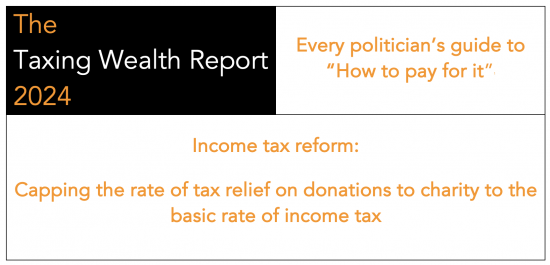I have now published the seventh recommendation in the series that will make up the Taxing Wealth Report 2024.

As the title makes clear, this recommendation replicates a proposal made by George Osborne in 2013 to cap the rate of income tax relief on donations to charity, limiting it to the basic rate of income tax.
As the summary of the note that supports this recommendation says:
Brief summary
This note suggests that:
- The higher rate of tax relief on donations made to charity by those who pay higher rates of income tax in the UK should be abolished.
- The existing relief is inequitable: it is inappropriate that those who pay higher rates of tax should be provided with a higher rate of tax relief when the action giving rise to that relief are the same whether a person is a basic or higher rate taxpayer.
- It is inappropriate that the higher rate of tax relief provided to the higher rate taxpayer as a result of their donation to charity benefits them and not the charity they donated to.
- This relief might distort the behaviour of charities within society.
- Removing this relief might save £740 million a year, increasing tax revenues by that amount as a result.
- Evidence collected by HMRC suggests that this relief has relatively little impact on the behaviour of higher rate taxpayers, who appear no more likely to use it than basic rate taxpayers, and that the behavioural consequence of the removal of this relief might be limited as a result.
Discussion
In 2013, an outcry from charities mainly supported by the wealthy and their wealthy donors forced George Osborne to back down on this issue, but subsequent research suggests that Gift Aid might not be nearly as significant to the wealthy as was thought, whilst the way in which this relief works remains an affront to all forms of tax justice. The time for the unequal and inequitable treatment that it provides to end should have arrived.
Cumulative value of recommendations made
The seven recommendations now made as part of the Taxing Wealth Report 2024 would, taking this latest proposal into account, raise total additional tax revenues of approximately £68.6 billion per annum.
Thanks for reading this post.
You can share this post on social media of your choice by clicking these icons:
You can subscribe to this blog's daily email here.
And if you would like to support this blog you can, here:



Well argued. The same approach could be applied to estate IHT whereby charitable gifts reduce estate 40 % IHT liability
Well argued. Osborne was Chancellor in coalition government and maybe felt too weak to do this 10 years ago. The government we have now has a near 80 seat majority.
It is interesting to note that donations to private (a.k.a “public”) schools count as charitable donations and hence particularly benefit the well off.
Perhaps private schools in general should not be charities. They claim to be so because they offer scholarships. But these skim off the brightest non-wealthy students and artificially inflate private school results. They are basically a form of advertising. So they are a self interested business practice, not charity. And, sometimes they open their facilities, for the odd day, to local state schools. But this isn’t useful and doesn’t justify charitable status.
Of course, there are some schools which cater specifically for disabled and disadvantaged. They should probably retain charitable status. But for normal private schools, merely speaking an advantage for their pupils at the expense of the rest of society, there is little justification.
I will have more to say on private schools…
You say “ Perhaps private schools in general should not be charities.”, I would say there should be no perhaps about it. I would think what these schools do does not meet most people’s expectations of the purpose of a charity.
Finance provision from an additional £750m HMRC revenue with
abolition of relief for income & inheritance tax, currently given to high earners contributing to charities, must the ring fenced wisely.
It can facilitate reform of other types of charity spending including in-sourcing of certain public services.
Does a need exist for a new national body providing helicopter rescue & transport services as a new branch of the NHS?
Helicopters are used by all blue light services (fire, police, ambulances, coastguard, RNLI, mountain & cave rescue, disaster response) , but are mostly provided by local charities.
However a new public national air rescue service coordinated by eg NHS could save time, money and lives.
Public money could thus be better spent with better long term strategic planning
Training, procurement and operational efficiency could all benefit from expertise in uk military